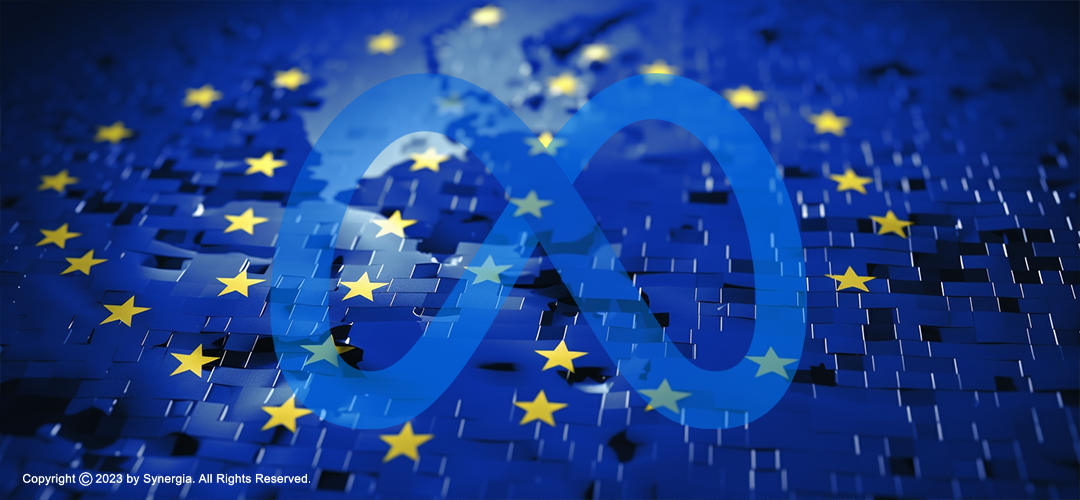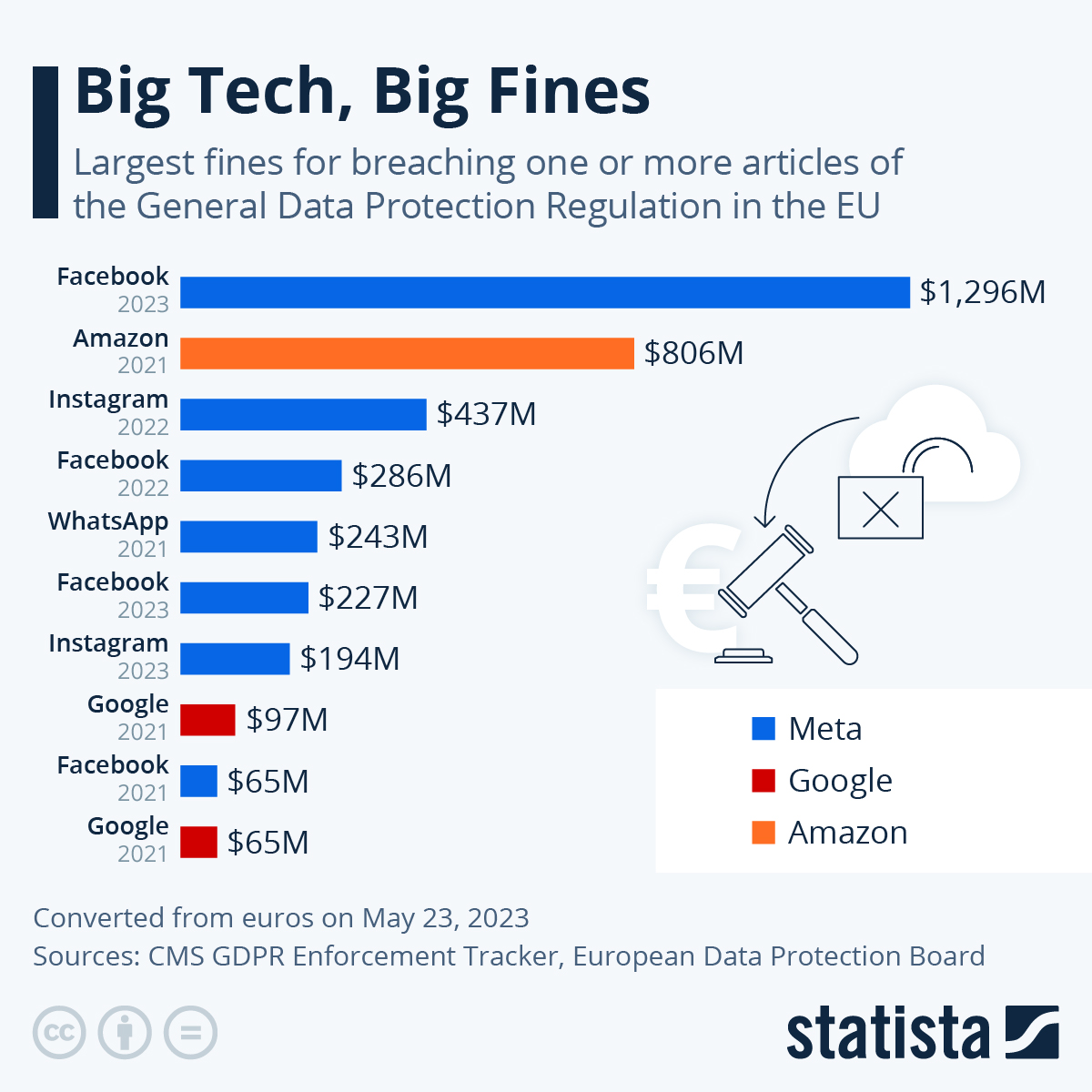€1.2 Billion GDPR Fine on Meta Platforms Inc.
May 27, 2023 | Expert Insights

Introduction
In a landmark case that has sent ripples through the technology world, the European Union has imposed a hefty €1.2 billion ($1.3 billion) fine on Meta Platforms Inc. for a notable violation - failure to sufficiently safeguard user data from exposure to U.S. security services. This verdict is the sternest yet in the enforcement of data protection rights, backed by an order from the Ireland's Data Protection Commission (DPC) for Meta to cease the transfer of European user data to the U.S.
The Unprecedented DPC Decision
The EU's General Data Protection Regulation (GDPR), a comprehensive legal framework for data protection and privacy, is central to this verdict. Through GDPR, the EU aims to empower its citizens with control over their personal data, obligating businesses to follow strict guidelines for collecting, storing, and processing such data. The decision by DPC, marking the most significant fine ever issued under the GDPR, is thus a strong statement underscoring the severity of Meta's violations.
The DPC's authority over Meta is based on the tech company's European headquarters located in Dublin, making the Irish commission the lead regulator for Meta in the EU. The DPC expressed a clear concern, noting Meta's ongoing data transfers to the U.S. overlooked "the risks to fundamental rights and freedoms" of individuals.
Repercussions for Meta Platforms Inc.
Beyond the significant monetary penalty, the fine raises fundamental questions about the sustainability of Meta's business model. If Meta adheres to the DPC's directive and discontinues the transfer of European user data to the U.S., it would strike at the heart of the company's operations.
While the full extent of the repercussions remains uncertain, depending on the specifics of the enforcement, Meta will undoubtedly need to reevaluate and revise its data handling practices. Such changes could affect its targeted advertising abilities, which contribute significantly to its revenue stream.
The Verdict’s Impact on the Global Data Privacy Landscape
The DPC's ruling is a decisive moment for the global tech industry's approach to data privacy. It underscores the EU's resolve in ensuring foreign companies operating within its jurisdiction comply with its data protection laws, potentially foreshadowing similar actions against other U.S. tech giants with comparable business models.
Moreover, the verdict could inspire similar protective measures worldwide. Non-EU countries may interpret this decision as a precedent, ushering in their own data protection measures that demand higher transparency from tech companies in their user data handling practices.
The User Data Privacy Perspective
From a user standpoint, the ruling is a remarkable victory for data privacy. It highlights the necessity for tech companies to balance the commercial advantages of data usage with individuals' privacy rights.
This landmark decision could lead to improved global data privacy standards, ultimately giving users more control over their personal data. The shift would fundamentally alter the relationship between tech giants and their users, tilting the power dynamics more favorably toward the users.
The Future of Data Privacy and Tech Giants
Looking ahead, tech companies will need to be more proactive in assessing their data management practices to ensure compliance with evolving data privacy laws. Tech giants must consider innovative ways to deliver personalized services and ads while respecting user privacy.
Moreover, businesses will need to foster transparency about their data practices, providing users with easy-to-understand information about how their data is used. Companies must also make it easier for users to exercise their data rights, such as the right to access, correct, and delete their data.
The Role of Regulatory Bodies
Regulatory bodies will also need to play their part by actively enforcing data protection laws and holding companies accountable for violations. They can provide guidance to businesses on complying with data protection laws and work with them to address any issues.
Furthermore, regulators can promote international cooperation on data privacy. They can work with their counterparts in other countries to develop common standards and procedures for data transfers, helping to create a more unified global approach to data privacy.
Looking Towards the Future
As the digital landscape continues to evolve, the question of balancing the needs of data-driven businesses and the privacy rights of users remains a critical challenge. This balance is crucial, not just for businesses and regulators, but also for society as a whole. Data can provide numerous benefits, from personalized services to advancements in fields like healthcare and education. However, these benefits must not come at the expense of individual privacy rights.
The ruling against Meta is a turning point, signalling a potential shift towards stronger data protection laws and enforcement. It raises the bar for tech companies, who will now have to reconsider their data practices and take user privacy more seriously.

Conclusion
The DPC’s €1.2 billion fine against Meta is an emphatic statement about the importance of data privacy. This landmark case sends a clear message to the global tech industry about the consequences of failing to protect user data.
As a result, companies will need to reevaluate their data practices and place a higher emphasis on user privacy. Meanwhile, users can look forward to more control over their data and potentially, greater respect for their privacy rights.
In the broader scheme, this case might inspire more countries to implement robust data protection laws and encourage a more global dialogue on data privacy. The repercussions of this ruling will continue to impact the tech industry and the discourse on data privacy for years to come. This case may have set a new course for how user data is handled and valued, truly marking a landmark moment for global data privacy.








Comments